Sacramento woman becomes full-time caregiver for both parents
When Kerri Sanford moved to Sacramento, she had no idea that in a few short years her parents would move in with her. Both of Kerri’s parents were diagnosed with dementia, and with no long-term care insurance or plan in place, Kerri became their caregiver. Four years later, Kerri changed her career to help others find insurance plans that fit their needs. She also shares the importance of taking care of yourself.
Multiple moves
Kerri Sanford was born and raised in Bellevue, WA by two loving parents Lena and Larry. Kerri went on to have her own family and when her son Maurice moved out, Kerri decided it was time for a change. In 2011 Kerri moved to Sacramento, following her friend who was moving there.
Since Lena had some health issues, Kerri knew that she’d have to make trips back to Washington to help her parents. A few years after her move, Kerri received a call from a friend of her parents, letting her know something was wrong and she should come home immediately.
Lena had been hiding things, writing notes that didn’t make sense, and was in a manic state. Larry had also been having cognitive issues but had kept it a secret from his family. Kerri flew out to help her parents. Lena was taken to the emergency room, where she stayed for two weeks before moving to a behavioral health treatment center.
“There is no place to put seniors in my mom’s situation,” said Kerri. “We had to wait for a room at the [behavioral health treatment center] for them to have a bed. She was there almost a month.”
In 2018, Kerri decided it was time for her parents to come and live with her. While Lena was at the treatment center, Kerri moved Larry to her home in Sacramento. In the meantime, Kerri had friends from church visit Lena until she was released, at which point Kerri was able to move her to Sacramento.
Help from her son
Lena had mobility issues and needed help with toileting, bathing and dressing, all tasks which fell to Kerri. Knowing she would need help, Kerri asked Maurice to move back in with her.
“I have an older home, and used every room,” said Kerri. “There wasn’t enough space. The bathrooms were small and I had bruises up and down my legs from getting my mom in and out of the wheelchair. At the time, I didn’t realize how much stress I was under, both emotional and physical.”
In addition to caring for her parents, Kerri had to return to their home in Washington to pack up their life and send it to Sacramento. Kerri said, “I had to unwind their life and clean their condo all while trying to work and care for them.”
In 2019, three months after Lena moved down with Kerri, Lena died. One week later, Larry was diagnosed with Alzheimer’s disease.
Distrust of doctors
According to the Alzheimer’s Association’s Alzheimer’s Disease 2021 Facts and Figures report, older Blacks are about twice as likely to have Alzheimer’s or other dementias as older White adults. On our survey, Blacks were also twice as likely as Whites to say they would not see a doctor if experiencing memory problems and 21% said they would feel insulted if a doctor suggested a cognitive assessment.
Additionally, when compared with White caregivers, Black caregivers are more likely to provide over 40 hours of care per week and are also more likely to care for someone living with dementia.
“In our culture we have a distrust of doctors because of past events,” said Kerri. “For people from my parents’ generation, you don’t go to a doctor to get a diagnosis.
“You live with the symptoms. We don’t tend to put our older family members in a [care setting] for multiple reasons; they’ll get best care from us, finances [can’t afford care], and this is how it was done in the past.”
Caregiving with COVID-19
Maurice, who is 32, has been helping care for his grandparents whenever Kerri needs extra help. “He’s been on this journey with me,” shared Kerri. “I threw my back out transferring my mom and he had to help.
“He would take shifts with me at night and helps if my dad needs something while I’m on the phone. I’m trying to keep him in ‘grandson mode’ because I know what it’s like and I could see him burning out.”
However, Maurice was put to the true test when Kerri caught COVID-19.
“I was isolated in the room upstairs and my son would bring water and food to the door,” said Kerri. “I couldn’t go downstairs when my dad was up. I was vaccinated but not boosted at the time. I was very sick, I thought I was going to die. I wanted my mom; I hadn’t been that sick in years.
“I went downstairs, I almost crawled downstairs; I saw the kitchen was a mess. What was my dad was eating!? I said to myself, ‘You know what, at least he’s eating.’
“All I could think about, was what will happen to my dad [if I die]. It was a test in learning to let go. I don’t know what I would have done without my son.”
Getting coverage
When Kerri began caring for her parents, she quickly learned that her parents hadn’t done anything to prepare for care at the end of their lives. “My parents are in their upper 80s and long-term care insurance was not talked about,” said Kerri.
“My parents didn’t have long term care insurance. My father has no life insurance. I’m losing money from not working and having to pay for [Larry’s care] out of my pocket. That’s money I won’t ever get back.”
Despite the lack of coverage, Kerri was able to get Larry signed up for Medi-Cal and learned he qualified for in-home support services (IHSS). However, because of COVID-19, Kerri didn’t want a stranger coming into her home. After two years, she’s just now starting the search for an in-home caregiver.
Changing her career
Kerri has worked in insurance for 25 years. Before she began caring for her parents, she was focused on voluntary and group health benefits. Because of how hard it was to get coverage for her parents, she has made it her mission to help families navigate things like Medicare and life insurance.
“I realized I was confused [about Medicare] and that this didn’t make sense, I was getting misinformation,” said Kerri. “God put it in my heart that I need to help people in this arena. I changed focus in my job.
“Medicare health insurance is complicated and confusing. Timing is important. I want to make sure people get accurate information to make the best decisions for themselves.
“I want to educate people on that. It doesn’t have to break the bank, but at least have something in place.
“People don’t think about what could happen. Life happens. You could be 50, 60, or 70 when something happens. How are you going to take care of yourself?
“I don’t want to put this burden on my adult son to care for me. I want him to stay in ‘son’ mode. He can help with some things, but I don’t want him to be a caregiver for me.”
Walk to End Alzheimer’s®
Kerri is also on the board of Sacramento Health Underwriters. In 2019, one of her fellow board members suggested they start a team for Walk to End Alzheimer’s in Sacramento. Kerri joined the team and participated in her first Walk that fall.
“I loved the Walk,’ said Kerri. “It was a great length and great time. I enjoyed the vendor booths where you can get information about different things. The energy, the speakers, the people that shared [their stories]. That was motivating.”
During COVID-19, Walk to End Alzheimer’s was everywhere. Kerri and other Walk participants across the country were given small flags to hold as they walked in their neighborhoods. “I have flags on my front porch,” said Kerri. “They’re always out there.”
Putting herself first
If there is one thing this journey has taught Kerri, it is that taking care of yourself is incredibly important. “I’m four and a half years into this gig,” said Kerri.
“I have serious health stuff that’s stress-related. When I was caring for my mom, my friends were so worried about me. When I look back on pictures of myself from that time, I can see I was hanging on by a thread.”
Here are some things Kerri does to help reduce stress and care for herself:
- Massage
- Exercise
- Spending time with friends
“I’m aware that [self-care] is a necessary thing,” said Kerry. “I need time to just be Kerri and not the caregiver. Take whatever it is that brings you joy and peace, something you enjoyed before this journey, that is what you need. Taking time for me refreshes me and I can come back with a new perspective. I take care of me to take care of my dad.”
When Lena was dying, Kerri promised her mother that she would care for her father. Recently, someone pointed out that just because she promised to take care of her dad, didn’t mean she had to be the one to physically do it.
“I know my boundaries and I know how far I can go,” said Kerri. “When he gets to a point where he can’t care for himself, I know that’s my boundary. I was doing everything for my mom, lifting carrying. That literally almost killed me.”
Caregiver tips
Kerri knows that when you’re deeply involved in caring for your loved one, taking the time to process information is hard. For caregivers she has this advice:
- “Be kind to yourself. You’re entitled to feel whatever you’re feeling: good, bad, ugly or indifferent.”
- “Find someone you can connect with that you can talk to with no judgment. I have my dear friend. I call her and say ‘This is what Papa did.’ Have someone you can talk to and get things off your chest, so you can keep on going.”
Now that Kerri has had time to process what is going on with her dad, she is grateful for the Alzheimer’s Association. Kerri says, “It’s hard to watch someone you care about deteriorate in that manner. I hope one day we have a cure.”
Putting financial and legal plans in place now allows the person with dementia to express wishes for future care and decisions. It also allows time to work through the complex issues involved in long-term care. Visit our website to learn more about financial and legal planning.
Learn more:





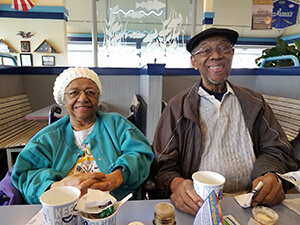
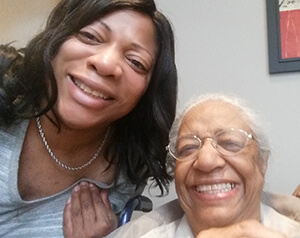
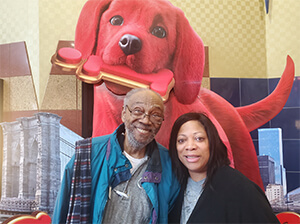
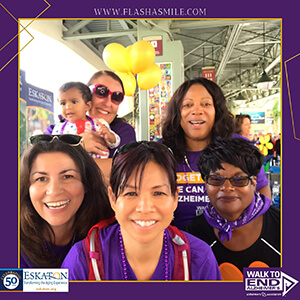
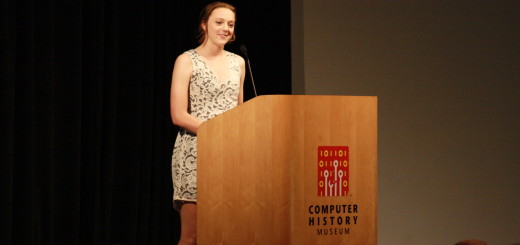
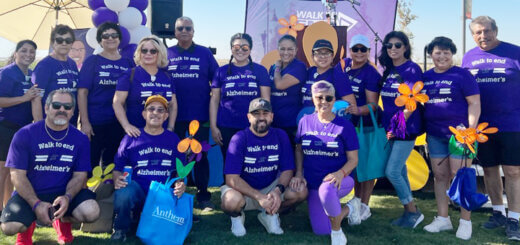
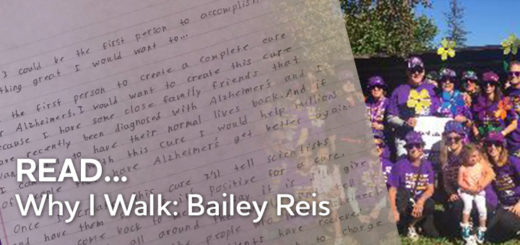










Kerry, I am in awe of you and the sacrifices you have made for your parents. You wouldn’t believe how often I miss your mom and dad. Thank you so much for sharing this story as I had no idea what has transpired. More so, bless you for taking on the mission of improving help for those facing end of life challenges.